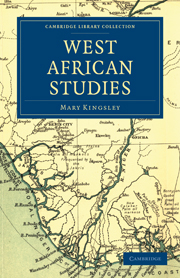Book contents
- Frontmatter
- PREFACE TO THE READER
- Contents
- LIST OF ILLUSTRATIONS
- CHAPTER I INTRODUCTORY
- CHAPTER II SIERRA LEONE AND ITS SURROUNDINGS
- CHAPTER III AFRICAN CHARACTERISTICS
- CHAPTER IV FISHING IN WEST AFRICA
- CHAPTER V FETISH
- CHAPTER VI SCHOOLS OF FETISH
- CHAPTER VII FETISH AND WITCHCRAFT
- CHAPTER VIII AFRICAN MEDICINE
- CHAPTER IX THE WITCH DOCTOR
- CHAPTER X EARLY TRADE IN WEST AFRICA
- CHAPTER XI FRENCH DISCOVERY OF WEST AFRICA
- CHAPTER XII COMMERCE IN WEST AFRICA
- CHAPTER XIII THE CROWN COLONY SYSTEM
- CHAPTER XIV THE CROWN COLONY SYSTEM IN WEST AFRICA
- CHAPTER XV MORE OF THE CROWN COLONY SYSTEM
- CHAPTER XVI THE CLASH OF CULTURES
- CHAPTER XVII AN ALTERNATIVE PLAN
- CHAPTER XVIII AFRICAN PROPERTY
- APPENDIX
- INDEX
- Plate section
CHAPTER XVII - AN ALTERNATIVE PLAN
Published online by Cambridge University Press: 05 December 2011
- Frontmatter
- PREFACE TO THE READER
- Contents
- LIST OF ILLUSTRATIONS
- CHAPTER I INTRODUCTORY
- CHAPTER II SIERRA LEONE AND ITS SURROUNDINGS
- CHAPTER III AFRICAN CHARACTERISTICS
- CHAPTER IV FISHING IN WEST AFRICA
- CHAPTER V FETISH
- CHAPTER VI SCHOOLS OF FETISH
- CHAPTER VII FETISH AND WITCHCRAFT
- CHAPTER VIII AFRICAN MEDICINE
- CHAPTER IX THE WITCH DOCTOR
- CHAPTER X EARLY TRADE IN WEST AFRICA
- CHAPTER XI FRENCH DISCOVERY OF WEST AFRICA
- CHAPTER XII COMMERCE IN WEST AFRICA
- CHAPTER XIII THE CROWN COLONY SYSTEM
- CHAPTER XIV THE CROWN COLONY SYSTEM IN WEST AFRICA
- CHAPTER XV MORE OF THE CROWN COLONY SYSTEM
- CHAPTER XVI THE CLASH OF CULTURES
- CHAPTER XVII AN ALTERNATIVE PLAN
- CHAPTER XVIII AFRICAN PROPERTY
- APPENDIX
- INDEX
- Plate section
Summary
Wherein the student, having said divers harsh things of those who destroy but do not reconstruct, recognises that, having attempted destruction, it is but seemly to set forth some other way whereby the West African colonies could be managed.
West Africa, I own, is a make of country difficult for a power with a different kind of culture, climate and set of institutions, and so on, to manage from Europe satisfactorily. But, as things go, I venture to think it presents no especial difficulty; that all the difficulties that exist in this matter are difficulties arising from misunderstandings,—things removable, not things of essence, barring only fever.
Also I feel convinced that no one of our English governmental methods at present existing is suitable for its administration. It is no use saying, Look at our Indian system, why not just introduce that into West Africa? I have the greatest admiration for our Indian system; it is the right thing in the right place, thanks to its having healthily grown up, fostered by experts, military and civil. Nevertheless it would not do for West Africa to-day. What we want there is the sowing of a similar system, not the transplanting of the Indian in its perfect form, for that is to-day for West Africa infinitely too expensive. If a man before his fortune is made spends a fortune, he ends badly; if he measures his expenditure with his income and develops his opportunities, he ends as a millionaire; and we must never forget that great dictum that the State is the perfection of the individual man, and should mould our politics accordingly.
- Type
- Chapter
- Information
- West African Studies , pp. 392 - 419Publisher: Cambridge University PressPrint publication year: 2010First published in: 1899



